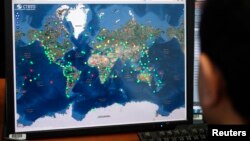Analysts say North Korea's test of what it says is a miniaturized nuclear device is a step forward in its goal of developing a weapon capable of striking the United States.
North Korea on Tuesday said its third underground nuclear test used a smaller and lighter atomic bomb than in previous tests in 2006 and 2009. Initial reports suggest it was also more powerful, generating significantly more explosive yield than its previous bombs.
Though it is impossible to confirm the exact nature and success of the test, the development suggests Pyongyang is making real progress at developing a nuclear bomb small enough to be placed on an intercontinental ballistic missile.
The issue is of even more concern given North Korea's recent success in launching a satellite into space using a long-range rocket that experts say is specifically designed to fit a nuclear warhead. If perfected, the two technologies pose a threat long feared by the international community.
"Their goal is clear - they want to have both a weaponized nuclear device, basically a warhead, and also a missile that is capable of delivering this warhead to targets in the United States and other distant countries," says veteran North Korea analyst Andrei Lankov. "They are advancing toward this goal and the advance is faster than most people have expected."
But while Lankov says North Korea has made "very significant" steps toward that goal, he acknowledges that years of research, development and tests likely need to be completed before Pyongyang's weapons could threaten the U.S. mainland.
N. Korean nukes don't yet threaten continental U.S.
North Korea's first goal, Lankov says, is designing a re-entry vehicle that could guide an intercontinental ballistic missile back to Earth once it has reached orbit.
"If you launch a space satellite, it's not supposed to go back (to earth). But if you're sending a warhead, it should descend into the target city to the target," he says. "So this means they have to develop a re-entry vehicle that will protect a warhead against high temperature and pressure of the re-entry."
Although Lankov calls this task "do-able," he says it is expensive, time-consuming, and would likely require multiple tests that North Korea is not believed to have even begun undertaking.
Another key question is whether North Korea's recently tested nuclear bomb is small and reliable enough to be placed on a missile and sent into space. Lankov says North Korea has not yet reached that goal, but warns that recent advances mean it will likely soon have the ability, "and possibly the will, to launch weapons directed at the United States."
Pre-emptive military action not on the table
But Lankov is quick to add that he does not believe North Korea would ever strike first. "They are not madmen. They are described as madmen, but they are essentially a bunch of cornered dictators who are fighting for their survival," he says. "They are not going to attack anybody unless provoked."
And Rory Medcalf with the Sydney-based Lowy Institute for International Policy says the likelihood of the United States or its allies preemptively attacking North Korean nuclear sites is practically non-existent.
"I think even if there ever was an opportunity for that, that horse has bolted," says Medcalf. "The (North Korean nuclear) program is well-advanced, and there's obviously a huge risk of retaliatory action against South Korea if a conflict ever were to ensue."
N. Korea not likely to abandon nuclear weapons
The strategic value and possible danger of North Korea's nuclear weapons lies not as much in the threat that it will use them against the United States or its allies, but in its potential to use them as a deterrent against U.S. forces in a possible future crisis, according to Medcalf.
"If the U.S. were to seek to deter North Korea from some course of action, North Korea will have a counter-deterrent - it will be able to call America's bluff on that, therefore damaging the credibility of America's extended deterrent over Japan and South Korea," he says.
North Korea's nuclear program has also proven useful as a bargaining chip that can be used to obtain foreign aid with little or no conditions attached.
Because of these benefits, Lankov says North Korea is not likely to give up its existing nuclear weapons program anytime soon. He says it is time for the world to realize that, despite all its efforts, North Korea will become a nuclearized state, and will likely stay that way.
"I don't think the North Korean leaders will ever consider denuclearization," says Lankov. "What they have got, they have got."
North Korea on Tuesday said its third underground nuclear test used a smaller and lighter atomic bomb than in previous tests in 2006 and 2009. Initial reports suggest it was also more powerful, generating significantly more explosive yield than its previous bombs.
Though it is impossible to confirm the exact nature and success of the test, the development suggests Pyongyang is making real progress at developing a nuclear bomb small enough to be placed on an intercontinental ballistic missile.
The issue is of even more concern given North Korea's recent success in launching a satellite into space using a long-range rocket that experts say is specifically designed to fit a nuclear warhead. If perfected, the two technologies pose a threat long feared by the international community.
"Their goal is clear - they want to have both a weaponized nuclear device, basically a warhead, and also a missile that is capable of delivering this warhead to targets in the United States and other distant countries," says veteran North Korea analyst Andrei Lankov. "They are advancing toward this goal and the advance is faster than most people have expected."
But while Lankov says North Korea has made "very significant" steps toward that goal, he acknowledges that years of research, development and tests likely need to be completed before Pyongyang's weapons could threaten the U.S. mainland.
N. Korean nukes don't yet threaten continental U.S.
North Korea's first goal, Lankov says, is designing a re-entry vehicle that could guide an intercontinental ballistic missile back to Earth once it has reached orbit.
"If you launch a space satellite, it's not supposed to go back (to earth). But if you're sending a warhead, it should descend into the target city to the target," he says. "So this means they have to develop a re-entry vehicle that will protect a warhead against high temperature and pressure of the re-entry."
Although Lankov calls this task "do-able," he says it is expensive, time-consuming, and would likely require multiple tests that North Korea is not believed to have even begun undertaking.
Another key question is whether North Korea's recently tested nuclear bomb is small and reliable enough to be placed on a missile and sent into space. Lankov says North Korea has not yet reached that goal, but warns that recent advances mean it will likely soon have the ability, "and possibly the will, to launch weapons directed at the United States."
Pre-emptive military action not on the table
But Lankov is quick to add that he does not believe North Korea would ever strike first. "They are not madmen. They are described as madmen, but they are essentially a bunch of cornered dictators who are fighting for their survival," he says. "They are not going to attack anybody unless provoked."
And Rory Medcalf with the Sydney-based Lowy Institute for International Policy says the likelihood of the United States or its allies preemptively attacking North Korean nuclear sites is practically non-existent.
"I think even if there ever was an opportunity for that, that horse has bolted," says Medcalf. "The (North Korean nuclear) program is well-advanced, and there's obviously a huge risk of retaliatory action against South Korea if a conflict ever were to ensue."
N. Korea not likely to abandon nuclear weapons
The strategic value and possible danger of North Korea's nuclear weapons lies not as much in the threat that it will use them against the United States or its allies, but in its potential to use them as a deterrent against U.S. forces in a possible future crisis, according to Medcalf.
"If the U.S. were to seek to deter North Korea from some course of action, North Korea will have a counter-deterrent - it will be able to call America's bluff on that, therefore damaging the credibility of America's extended deterrent over Japan and South Korea," he says.
North Korea's nuclear program has also proven useful as a bargaining chip that can be used to obtain foreign aid with little or no conditions attached.
Because of these benefits, Lankov says North Korea is not likely to give up its existing nuclear weapons program anytime soon. He says it is time for the world to realize that, despite all its efforts, North Korea will become a nuclearized state, and will likely stay that way.
"I don't think the North Korean leaders will ever consider denuclearization," says Lankov. "What they have got, they have got."












